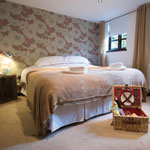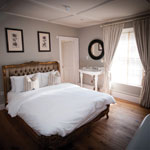Property focus – Make room for extra revenue
Adding letting rooms to your pub can not only provide an extra revenue stream to your business, it can also increase your existing food, beverage and event income. But converting from a pub to an inn, or perhaps even a small boutique hotel, is a big step. Elly Earls finds out what's involved
Diversification is absolutely key in today's uncertain financial climate, and for publicans, that means adding letting rooms, creating function space or, ideally, both of the above.
"Lot of pubs are suffering from decreasing liquor and food turnover, and adding rooms creates another income stream," explains David Queen, owner of hospitality consultancy ConsultInn.
"Moreover, the by-product of adding an extra income stream is that you also increase your food and liquor turnover because you have people resident on site that will generally spend money with you rather than going elsewhere."
It's also a way of eeking everything you can out of space you've got available. "Pubs often have surplus unused space and converting outbuildings or even domestic accommodation into letting rooms can make your business really work for you," Queen confirms.
Add function rooms to the mix and the potential difference to your business can be extraordinary. "I look at it as being the icing on the cake," says Queen. "It really can make an enormous difference to your profitability."
The good, the bad and the ugly: plan for all eventualities
Unfortunately, creating an extra income stream is by no means a straightforward process, and before even considering getting started, it's crucial that you understand your market. "This is something that people so often get wrong," Queen notes. "They don't understand what they're trying to achieve and who their target market is."
But it's not just about assessing the local market for the very near future. "You've got to know the demand is there for the long term," says Simon Chaplin, director of corporate pubs and restaurants at Christie & Co. "Putting hotel bedrooms on a pub is a big investment; it produces a very good return but this takes time. You're looking at three, if not five, years before you start making money out of your letting rooms."
A business plan is therefore absolutely essential. "You'd need to look at three or four scenarios of how your business could go over the next three years - the good, the bad, and the ugly," Queen advises.
Within this, you will need to budget in all of your set-up costs, such as fixtures and fittings, which will usually be written off over three to five years, as well as ongoing controllable costs, including Wi-Fi, your website and marketing.
According to Queen, one of the most common pitfalls publicans fall into is overestimating the first and second years' income after the addition of letting rooms. "The start-up cost and the start-up time for letting rooms is far greater than it is for a restaurant or a pub," he says. "And, in the first year, people always overestimate their occupancy. For example, they will budget for 50-60% occupancy but only get 25-30%."
Marketing is an invaluable tool to take the edge off that first difficult year. "Hopefully, you'll know your market before you build your rooms," Chaplin notes, but beyond that there are several strategies you can pursue. "If you've got a decent number of rooms, you need to be running your own website, but in all cases, you need to be listed with your local tourist office, and you need to go to local businesses and create interest there."
"Also, consider lowering your margin and doing deals with local businesses so people can experience the benefit of using your business," Queen adds. "Having experienced it, they should come back at full cost next time."
When does it become a worthwhile investment?
Adding letting rooms to your pub is a big commitment, so is it really worth it if you're only considering adding two or three rooms? Probably not, according to Queen.
"I certainly wouldn't entertain having any letting accommodation under three rooms," he remarks. "It costs just as much to market one room as it does to market 10 and your lifestyle changes quite dramatically in terms of the hours you need to put in. It's simply not worth the effort for anything under three, possibly four rooms, in today's market."
For Jane Bravey, operations manager for Fullers' Hotels and Inns, the figure is higher still. "We've bought existing businesses that have as few as four bedrooms, but with the pubs we've developed over the past few years, you're looking at eight and upwards really in terms of payback," she says.
Beyond that, your establishment moves into the territory of a small hotel and the goalposts change once again. "You become a totally different animal if you decide to add 10 to 12 rooms," Chaplin explains. "You can afford to take people on to cover the beginning and the end of the day."
Legal issues
On top of set-up, marketing, staffing and other ongoing costs, there are certain standards that need to be adhered to - legally - before opening up a pub with letting rooms.
While this can vary significantly depending on where you're located and the type of building in which your business is situated, there are a few things that all prospective inn operators need to consider.
For example, all accommodation providers, by law, must carry out a fire risk assessment, which is a time-consuming but essential audit. Full details of what is required can be found at www.communities.gov.uk. Remember, also, to include the potential cost of fire alarms, lighting, fire doors, building material and even a fire escape in your initial business plan.
Second, don't forget to contact your local authority to find out about your council's policy on existing and new accommodation. "It all depends whether the building is listed, whether it's in a conservation area, and individually on the local authority," says Bravey. In any case, get an outline planning application in early; the planning department is then required to respond to you within six weeks.
Yet, while there are myriad factors to take into account before adding letting rooms to your pubs, it really can be worth it. "It's a third income stream for your business," Bravey concludes. "If you currently don't have that, it makes you so much more diverse."
Tapping into an additional revenue stream
"We saw the rooms as a great additional stream of revenue to our business, especially with our location close to Gatwick and a short drive from London," explains Anthony Pender, director of the Yummy Pub Company.
Although Pender faced challenges during the conversion due to poor maintenance from the pub's previous owners, he has no regrets about his decision.
"The six rooms have contributed nearly £60,000 per year to our business and there is also the knock-on effect of those guests then eating and drinking in the pub," he says. "We find that during the week a lot of business stays will treat themselves to a few extra pints and a steak as they are away from home.
"At the weekend, guests who use us as a weekend getaway will have a meal with us and generally go for three courses and a couple of bottles of wine. These guests become our highest spend per head guests."
Guests will also contribute to F&B sales
In April 2011, Brakspear and White Hart tenants, the Tailor Made Dining Company, spent £250,000 on a refurbishment of the pub, which included upgrading its 12 existing bedrooms to boutique hotel standard. Earlier this year, the company converted a house adjoining the pub to add a further six bedrooms plus a honeymoon suite, bringing to 19 the total number of letting rooms at the site.
According to Ted Docherty, director of the Tailor Made Dining Company, the letting rooms make the White Hart a far more viable business than it would be otherwise. "Guests staying in our rooms generally dine with us at least once during their stay, so they are contributing to our food and drink sales as well as the accommodation revenue they bring," he says.
The White Hart has been achieving an average 55% occupancy rate since the new rooms opened in the spring, and is expecting this to lift over the summer.
Docherty adds: "We invested heavily in the design and fittings of the guest rooms. Customers have high expectations these days and you have to provide much more than just a bed for the night. Our rooms really do impress our guests and that's paying dividends as they return and recommend us to friends and family."
Tips for adding letting rooms to your pub
â- A detailed business plan is an absolute must. Include both your initial set-up costs and ongoing costs such as staffing and Wi-Fi.
â- Put together a comprehensive marketing strategy, including both national agencies and local businesses.
â- Don't add fewer than four rooms. The effort and investment required won't be worthwhile.
â- Furnish and fit your rooms to a high standard. It doesn't take much more money to install a good-quality bed than a second-rate bed.
â- Free Wi-Fi is expected in any establishment with letting rooms. If you don't have it, you're less likely to get repeat custom.
â- Tick all the health and safety boxes. This will include a fire risk assessment and an accessibility statement, among other things.
â- Contact your local authority early regarding planning permission.
â- If you have function rooms, go out to market with them. This adds a huge amount of value to customers like wedding guests.
â- If you're an existing operator who wants to add rooms, you shouldn't have a problem with funding, but if you don't have any industry experience, it could be much more difficult.












